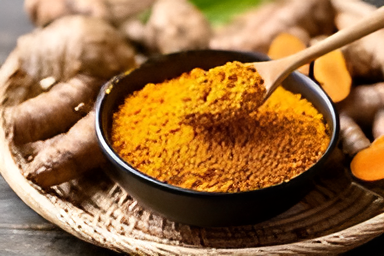
Turmeric: The Golden Spice of Health
Turmeric, scientifically known as Curcuma longa, is a bright yellow spice that has been revered for centuries for its medicinal properties and culinary versatility. Originating from Southeast Asia, turmeric has become a staple in various cuisines and traditional medicine systems, particularly in Ayurveda and Traditional Chinese Medicine.
The Active Ingredient: Curcumin
One of the most notable components of turmeric is curcumin. This bioactive compound is responsible for many of turmeric’s health benefits, including its anti-inflammatory and antioxidant properties. Research has shown that curcumin can combat oxidative stress and may help in preventing chronic diseases.
Health Benefits of Turmeric
- Anti-Inflammatory Properties:Heart disease, cancer, and neurological diseases are among the health problems that are associated with chronic inflammation. Turmeric’s anti-inflammatory effects can help reduce inflammation in the body, making it a popular natural remedy.
- Antioxidant Effects: Curcumin is a potent antioxidant that can neutralize free radicals and boost the body’s own antioxidant enzymes. This action helps protect cells from damage and supports overall health.
- Improved Brain Function: Some studies suggest that curcumin can increase levels of brain-derived neurotrophic factor (BDNF), a protein linked to improved brain function and reduced risk of neurodegenerative diseases.
- Heart Health: Turmeric may improve heart health by improving the function of the endothelium, the lining of blood vessels. Curcumin’s anti-inflammatory and antioxidant properties contribute to this benefit.
- Digestive Health: Turmeric has been used traditionally to alleviate digestive issues. Its anti-inflammatory properties can help soothe the digestive tract, and it may assist in reducing symptoms of conditions like irritable bowel syndrome (IBS).
- Joint Health: Many people use turmeric for arthritis relief. Its anti-inflammatory properties can help reduce joint pain and stiffness, making it beneficial for those suffering from osteoarthritis and rheumatoid arthritis.
- Potential Cancer Prevention: Some studies have suggested that curcumin may help in the prevention of certain types of cancer by affecting cancer growth, development, and spread at the molecular level.
- Skin Health: Turmeric’s anti-inflammatory and antimicrobial properties make it a popular ingredient in skincare products. It can help with acne, psoriasis, and other skin conditions.
Culinary Uses of Turmeric
Turmeric is not just a health supplement; it is a vibrant spice used in various dishes. Commonly used in Indian and Middle Eastern cuisine, turmeric adds a warm, earthy flavor and a golden hue to curries, rice, soups, and marinades. Turmeric can also be used to make golden milk, a nourishing drink made with milk (or plant-based milk), turmeric, black pepper, and sweeteners.
How to Incorporate Turmeric into Your Diet
- Golden Milk: Combine milk (or a dairy-free alternative) with turmeric, black pepper, and honey or maple syrup. Heat it up for a warming drink.
- Curries: Add turmeric to your favorite curry recipes for added flavor and health benefits.
- Smoothies: Blend a teaspoon of turmeric into your morning smoothie for a health boost.
- Soups and Stews: Incorporate turmeric into soups and stews for color and flavor.
- Turmeric Tea: Steep fresh turmeric root or use turmeric powder in hot water with lemon and honey for a soothing tea.
- Seasoning: Sprinkle turmeric on roasted vegetables, salads, or even popcorn for a unique flavor.
The Importance of Bioavailability
While turmeric has numerous health benefits, curcumin’s bioavailability is relatively low, meaning that the body doesn’t absorb it efficiently. To enhance absorption, it’s often recommended to consume turmeric with black pepper, which contains piperine—a natural compound that can increase curcumin absorption by up to 2000%. Additionally, consuming turmeric with healthy fats, such as coconut oil or olive oil, can further enhance its absorption.
Potential Side Effects and Considerations
While turmeric is generally safe for most people when consumed in culinary amounts, high doses of curcumin may cause gastrointestinal issues, such as upset stomach or diarrhea. Individuals with gallbladder problems, blood disorders, or those on blood-thinning medications should consult a healthcare provider before taking turmeric supplements.
Conclusion
Turmeric is a remarkable spice that offers a wealth of health benefits, from its powerful anti-inflammatory and antioxidant properties to its potential role in supporting brain and heart health. With its versatility in the kitchen, it’s easy to incorporate turmeric into your diet. Whether you enjoy it in a warm cup of golden milk or as a key ingredient in your favorite curry, turmeric can enhance both your culinary creations and your overall well-being.
As with any supplement or dietary change, it’s always best to consult with a healthcare professional, especially if you are considering using turmeric in therapeutic doses. Embracing this golden spice can lead to a flavorful and healthful addition to your daily routine.